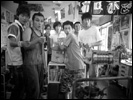Summer Time Machine Blues
- Year
- 2005
- Original title
- Sama Taimu Mashin Burusu
- Japanese title
- サマータイムマシン・ブルース
- Director
- Cast
- Running time
- 107 minutes
- Published
- 16 January 2007



by Adam Campbell
Summer Time Machine Blues got a little lost last year despite having a high profile director in the shape of Katsuyuki Motohiro. Motohiro is perhaps better known as the director of the generally light-hearted and fun Bayside Shakedown films, and the plodding and tedious spin-off Negotiator. Luckily for everyone, Summer Time Machine Blues leans more toward light-hearted fun than plodding tedium. All the more fortunate, as a dull film with a title and concept like Summer Time Machine Blues would be unbearable.
As a successful time travel film, the plot runs contrary to a quick summary. The basics involve the members of a university sci-fi club, and their neighbouring two-girl photography club, who are whiling away their dreamy summer playing 3-on-3 baseball with a dog. In the hottest weather a camera can exaggerate, the boys accidentally break their air conditioner. Handily, a traveller from the future appears, with a ride-on time machine even! The boys decide to use the device to prevent the destruction of the precious air conditioner and save themselves from another sweaty afternoon. Hilarity, as they say, ensues.
The film wears its sci-fi references on its sleeve. Back to the Future is naturally evoked, both in imitation and in the diegetic world, with the poster proudly on display outside the neighbourhood cinema. Several shots of the university clock call to mind those of the town hall clock which dominates much of the Zemeckis films. The owner of the sci-fi B movie cinema is dressed as Commander Riker from Star Trek: The Next Generation, complete with a Starfleet tunic, and dishes out faulty scientific advice as gleaned from a million hokey pictures. The time machine itself is basically The Time Machine, as it appears in the 1960 George Pal film with Rod Taylor.
The screenplay's roots as a stage play are also apparent. Extensive use is made of the single clubroom location. However, there's nothing necessarily cinematically limiting about this and Motohiro keeps the film visually interesting. The time travel sequences often visually overlap with bi-temporal split screens using the same framing. Things are kept fairly fast and punchy, as demonstrated by the film's almost cold opening into the bizarre baseball game, a title card not appearing until the entire set-up for the film has been established. An exaggerated special effect / slow motion shot (mostly done in camera) details the destruction of the air conditioner in an amusing kind of visual mock heroic, but one that apes a similar scene in Shinobu Yaguchi's Swing Girls.
Indeed the film seems to be Motohiro's stab at exactly the kind of fun, summer, ensemble teen picture that Yaguchi has mastered with films like Water Boys and Swing Girls. It's worth noting that the leads in this film are Eita, star of the Water Boys TV show, and Juri Ueno, star of Swing Girls. Both perform adequately here with characters that were never going to stretch them, and the energy of the young cast helps lift some scenes that otherwise would have dragged.
Summer Time Machine Blues has a small scale and the boys have a charmingly small plan. The filmmakers explore the wealth of big problems such a tiny nudge in time would have, never mind the huge shoves that protagonists in Hollywood time travel films cause. Motohiro also manages to touch on different aspects of time, especially with regards to Akira, the visitor from the future. The cyclical nature of time is amusingly shown in the clothes of 2030, where the styles of the 1950s seem to be back in fashion (although for me personally they never went out!). The realistic idea of the near future being unexciting is also shown, as Akira says the town hasn't changed much and the sci-fi clubroom is exactly the same, just dirtier.
The time traveling is a fun angle on this kind of picture, but also ties together well, even if it's not especially complicated. Fans of films like Shane Carruth's Primer might find the explanations and hand-holding a bit obnoxious, but most of these exchanges are brief and/or humorously self-conscious. It also allows the film to play to a range of audiences, including the young teen demographic at which it is primarily aimed. Summer Time Machine Blues is mainstream entertainment but it is actually entertaining which, unfortunately, stands out as quite a major achievement among recent Japanese entertainment films. Motohiro has demonstrated here that he can navigate a teen sci-fi farce as well as a humorous bureaucratic police drama, that is to say, rather well. Thankfully the film doesn't outstay its welcome and is perhaps best enjoyed on just the kind of aimless August afternoon it depicts.